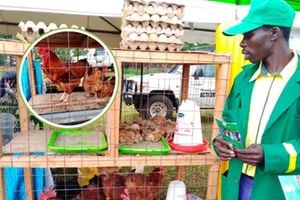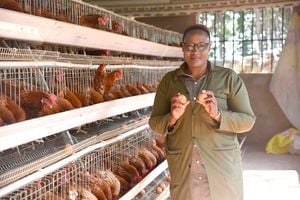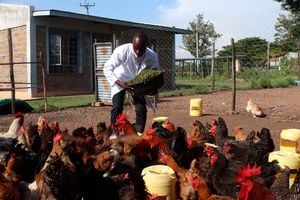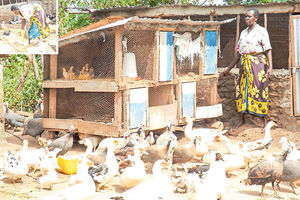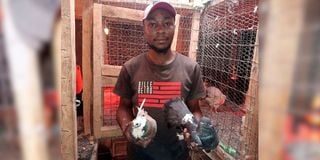
Denis Mulanda displays some of his ornamental birds in Nairobi's Huruma estate.
Denis Mulubi Mulanda has been keeping ornamental birds for some time now. He has been rearing doves, ducks, and chickens in Huruma, Nairobi County.
“I started in 2017; it is now seven years. I began as a young farmer, rearing two chickens – a layer and a cock,” he reveals, adding that he bought the female for Sh500 and the cock for Sh900.
At first, he used a simple structure, spending little on capital. However, he later constructed proper structures at a cost of approximately Sh15,000, which he is currently using.
The structures are built in a manner that accommodates different birds, with some, like the ornamental ones, housed in the upper part of the vertical structures.
The structures hold many birds, and the farmer has also connected electricity to the poultry house to keep it warm, especially during cold seasons and at night.
Mulanda says that since he began venturing into this type of farming, he has never stopped and has no intentions of quitting anytime soon, despite the challenges he sometimes faces.
He reveals that poultry farmers encounter issues such as diseases and high feed prices.
“These are some of the challenges we go through, but we still continue,” he says.

Denis Mulanda displays some of his chicke in Nairobi's Huruma estate. Peter Changtoek | Nation Media Group
The main challenge is poultry diseases, including Newcastle, Gumboro, fowl pox, and infectious coryza. To mitigate some diseases, he reduces the number of times he introduces new birds into his stock.
Apart from diseases, he also faces market challenges and a lack of space.
“I pay Sh2,500 for the space per month,” says Mulanda.
“I rear pure kienyeji and also improved kienyeji. I prefer to mix them because pure kienyeji are capable of brooding, but improved kienyeji do not brood. I also rear doves and ducks,” says the farmer, who keeps the different breeds in separate structures.
Mulanda sells the birds at different stages.
“I sell one-month-old chicks for Sh350, two-month-old ones for Sh450, and mature chickens for Sh1,000 and above, while cocks go for Sh1,500 and above,” he adds.
There are several factors he considers when selling chickens, including age and weight.
“A customer looks at the weight before accepting the price you offer,” he explains.
The farmer, who sold many chickens during the festive season at the end of the year, notes that egg production decreases during cold seasons because the weather affects the birds. He sells each egg for Sh25.
“Right now, I have eight ducks remaining; I have sold some of them. For doves, I have 12. I normally sell them as well,” he reveals.
“I sell a male duck for Sh1,000–Sh1,200, and females for Sh800–Sh900,” says Mulanda, adding that he sometimes gets customers who buy the female ducks for Sh1,000.
He says he has various breeds of doves, including crossbreeds.
“I sell the common ones for Sh500 for both males and females – their prices are the same. For crossbreeds, some sell for Sh2,500 or Sh3,000, and there are those that go for Sh4,000."

